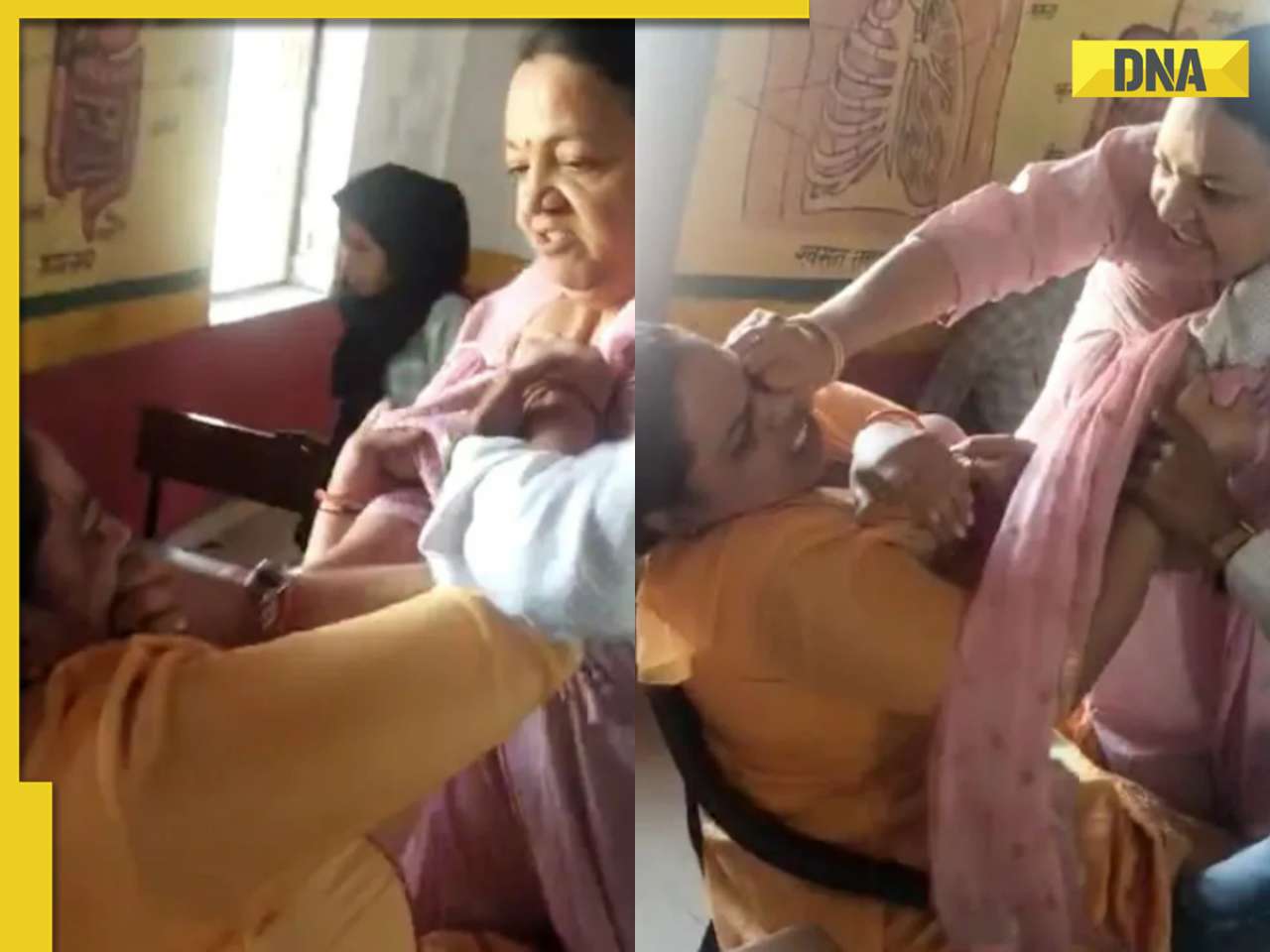The MSM has also demanded a ban on the "outdated and inhuman" provision of Halala in Muslim personal law, which is demeaning for women
After the Narendra Modi-led government's decision to make triple talaq illegal, the Muslim Satyashodhak Mandal (MSM) has demanded that the proposed legislation be extended to cover all forms of divorce granted by the Muslim community under its personal laws.
Activists of the Mandal founded by social reformer Hamid Dalwai, met Modi in New Delhi on Monday and sought that all cases of divorce be settled through courts to prevent discrimination and ensure justice and that an 'Indian Marriage Act' be prepared for all communities.
"We have requested that not just instant triple talaq i.e talaq-e-biddat, but all forms of talaq be banned by the central government. This will ensure that divorce cases are decided in courts and not outside it. Till the court decides on this divorce, the couple should not be allowed to remarry. Laws prohibiting bigamy should also be extended to Muslims," MSM president Prof Shamshuddin Tamboli told DNA.
He stressed that the issue should be looked at comprehensively and not a piecemeal basis. The MSM has also demanded a ban on the "outdated and inhuman" provision of Halala in Muslim personal law, which is demeaning for women. In halala, a divorced woman has to marry another man who will divorce her after which she can marry her original husband.
On Monday, Tamboli and activists of the mandal, namely former president Sayyadbhai, Jameer Shaikh, Dilawar Shaikh, Sameer Shaikh and Niyaz Attar met Modi with BJP Rajya Sabha MP Vinay Sahasrabuddhe. They will also meet leaders from other parties to build a consensus on the issue.
The memorandum submitted to Modi noted that "considering the complexity of Muslim womens' problems" the proposed Muslim Women (Protection of Rights on Marriage) bill, may not be able to address these issues and ensure justice for Muslim women. It demanded that other forms of talaq like talaq-e-Hasan, talaq-e-Ahasan, talaq-e-Khula also be banned since they were one-sided and had male dominated provisions.
Apart from the custody of minor children, the bill should also incorporate provisions for the maintenance of children and victims.
"Banning instant triple talaq i.e talaq-e-Biddat without banning polygamy may intensify the existing problems of Muslim women," the MSM noted, seeking a draft Muslim Marriage and Divorce Act in consultation with stakeholders.
"Though we support the Uniform Civil Code, considering the politics around it, an Indian Marriage Act should be approved. Now, around 95% of criminal and civil laws like the Indian Evidence Act, 1872, and Indian Penal Code, 1860, are common for all communities… the proposed marriage act will ensure uniformity in marriage, divorce, alimony, adoption and inheritance," said Tamboli, adding this would ensure secularism, equality and gender justice.
On April 18, 1966, Hamid Dalwai, an author and founder of the Indian Secular Society, had organised a morcha of the Muslim women at the receiving end of the oral, one-sided divorce, at the state administrative headquarters and submitted a memorandum to then chief minister Vasantrao Naik. The Mandal was launched in March 1970 for social and religious reforms among Muslims but faced opposition from orthodox sections within the community.
![submenu-img]() 'Baap re baap': Imtiaz Ali reveals Diljit Dosanjh was scandalised by old women's 'vulgar' improvisation on Chamkila set
'Baap re baap': Imtiaz Ali reveals Diljit Dosanjh was scandalised by old women's 'vulgar' improvisation on Chamkila set![submenu-img]() Viral video: Man educates younger brother about mensuration, internet is highly impressed
Viral video: Man educates younger brother about mensuration, internet is highly impressed![submenu-img]() Taiwan detects seven Chinese military aircraft, five naval vessels near its waters
Taiwan detects seven Chinese military aircraft, five naval vessels near its waters![submenu-img]() This actor, who worked with Karan Johar and Farhan Akhtar, gave superhit shows, saw failed marriage, killed himself at..
This actor, who worked with Karan Johar and Farhan Akhtar, gave superhit shows, saw failed marriage, killed himself at..![submenu-img]() Girl's wedding dance to Haryanvi song interrupted by mother in viral video, internet reacts
Girl's wedding dance to Haryanvi song interrupted by mother in viral video, internet reacts![submenu-img]() DNA Verified: Is CAA an anti-Muslim law? Centre terms news report as 'misleading'
DNA Verified: Is CAA an anti-Muslim law? Centre terms news report as 'misleading'![submenu-img]() DNA Verified: Lok Sabha Elections 2024 to be held on April 19? Know truth behind viral message
DNA Verified: Lok Sabha Elections 2024 to be held on April 19? Know truth behind viral message![submenu-img]() DNA Verified: Modi govt giving students free laptops under 'One Student One Laptop' scheme? Know truth here
DNA Verified: Modi govt giving students free laptops under 'One Student One Laptop' scheme? Know truth here![submenu-img]() DNA Verified: Shah Rukh Khan denies reports of his role in release of India's naval officers from Qatar
DNA Verified: Shah Rukh Khan denies reports of his role in release of India's naval officers from Qatar![submenu-img]() DNA Verified: Is govt providing Rs 1.6 lakh benefit to girls under PM Ladli Laxmi Yojana? Know truth
DNA Verified: Is govt providing Rs 1.6 lakh benefit to girls under PM Ladli Laxmi Yojana? Know truth![submenu-img]() Streaming This Week: Heeramandi, Shaitaan, Manjummel Boys, latest OTT releases to binge-watch
Streaming This Week: Heeramandi, Shaitaan, Manjummel Boys, latest OTT releases to binge-watch![submenu-img]() Remember Ayesha Kapur? Michelle from Black, here's how actress, nutrition coach, entrepreneur looks after 19 years
Remember Ayesha Kapur? Michelle from Black, here's how actress, nutrition coach, entrepreneur looks after 19 years![submenu-img]() Remember Heyy Babyy's cute 'Angel' Juanna Sanghvi? 20 year-old looks unrecognisable now, fans say 'her comeback will...'
Remember Heyy Babyy's cute 'Angel' Juanna Sanghvi? 20 year-old looks unrecognisable now, fans say 'her comeback will...'![submenu-img]() In pics: Arti Singh stuns in red lehenga as she ties the knot with beau Dipak Chauhan in dreamy wedding
In pics: Arti Singh stuns in red lehenga as she ties the knot with beau Dipak Chauhan in dreamy wedding![submenu-img]() Actors who died due to cosmetic surgeries
Actors who died due to cosmetic surgeries![submenu-img]() DNA Explainer: Why Harvey Weinstein's rape conviction was overturned, will beleaguered Hollywood mogul get out of jail?
DNA Explainer: Why Harvey Weinstein's rape conviction was overturned, will beleaguered Hollywood mogul get out of jail?![submenu-img]() What is inheritance tax?
What is inheritance tax?![submenu-img]() DNA Explainer: What is cloud seeding which is blamed for wreaking havoc in Dubai?
DNA Explainer: What is cloud seeding which is blamed for wreaking havoc in Dubai?![submenu-img]() DNA Explainer: What is Israel's Arrow-3 defence system used to intercept Iran's missile attack?
DNA Explainer: What is Israel's Arrow-3 defence system used to intercept Iran's missile attack?![submenu-img]() DNA Explainer: How Iranian projectiles failed to breach iron-clad Israeli air defence
DNA Explainer: How Iranian projectiles failed to breach iron-clad Israeli air defence![submenu-img]() 'Baap re baap': Imtiaz Ali reveals Diljit Dosanjh was scandalised by old women's 'vulgar' improvisation on Chamkila set
'Baap re baap': Imtiaz Ali reveals Diljit Dosanjh was scandalised by old women's 'vulgar' improvisation on Chamkila set![submenu-img]() This actor, who worked with Karan Johar and Farhan Akhtar, gave superhit shows, saw failed marriage, killed himself at..
This actor, who worked with Karan Johar and Farhan Akhtar, gave superhit shows, saw failed marriage, killed himself at..![submenu-img]() Did you know Ranveer Singh's grandmother was popular actress? Worked with Raj Kapoor; her career affected due to...
Did you know Ranveer Singh's grandmother was popular actress? Worked with Raj Kapoor; her career affected due to...![submenu-img]() India's highest-paid TV actress began working at 8, her Bollywood films flopped, was seen in Bigg Boss 1, now charges...
India's highest-paid TV actress began working at 8, her Bollywood films flopped, was seen in Bigg Boss 1, now charges...![submenu-img]() Shreyas Talpade wonders if his heart attack was due to Covid vaccine: 'We don’t know what we have taken inside...'
Shreyas Talpade wonders if his heart attack was due to Covid vaccine: 'We don’t know what we have taken inside...'![submenu-img]() IPL 2024: Faf du Plessis, Virat Kohli help Royal Challengers Bengaluru defeat Gujarat Titans by 4 wickets
IPL 2024: Faf du Plessis, Virat Kohli help Royal Challengers Bengaluru defeat Gujarat Titans by 4 wickets![submenu-img]() IPL 2024: Why is Sai Kishore not playing today's RCB vs GT match?
IPL 2024: Why is Sai Kishore not playing today's RCB vs GT match?![submenu-img]() 'Mumbai Indians ki kahani khatam': Ex-India star slams Hardik Pandya after MI's loss to KKR at Wankhede
'Mumbai Indians ki kahani khatam': Ex-India star slams Hardik Pandya after MI's loss to KKR at Wankhede![submenu-img]() LSG vs KKR, IPL 2024: Predicted playing XI, live streaming details, weather and pitch report
LSG vs KKR, IPL 2024: Predicted playing XI, live streaming details, weather and pitch report![submenu-img]() LSG vs KKR IPL 2024 Dream11 prediction: Fantasy cricket tips for Lucknow Super Giants vs Kolkata Knight Riders
LSG vs KKR IPL 2024 Dream11 prediction: Fantasy cricket tips for Lucknow Super Giants vs Kolkata Knight Riders![submenu-img]() Viral video: Man educates younger brother about mensuration, internet is highly impressed
Viral video: Man educates younger brother about mensuration, internet is highly impressed![submenu-img]() Girl's wedding dance to Haryanvi song interrupted by mother in viral video, internet reacts
Girl's wedding dance to Haryanvi song interrupted by mother in viral video, internet reacts![submenu-img]() Viral video: Man fearlessly grabs dozens of snakes, internet is scared
Viral video: Man fearlessly grabs dozens of snakes, internet is scared![submenu-img]() This mysterious mobile phone number was suspended after three users...
This mysterious mobile phone number was suspended after three users...![submenu-img]() School principal, teacher engage in physical altercation in Agra, video goes viral
School principal, teacher engage in physical altercation in Agra, video goes viral





































)









)
)
)
)
)
)